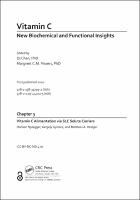Chapter 3 Vitamin C Alimentation via SLC Solute Carriers
Proposal review
Author(s)
Nydegger, Damien
Gyimesi, Gergely
Hediger, Matthias
Language
EnglishAbstract
Although mortality rates from pneumonia and sepsis are decreasing in many parts of the world, the incidence of these conditions continues to rise, likely due to an increasingly ageing population. Case reports and observational studies indicate a strong association between vitamin C status and infectious conditions, with vitamin C deficiency predisposing individuals to infections, and conversely, infections precipitating a diminished vitamin C status. The requirements for vitamin C increase with the severity of the infectious condition, with gram amounts required to normalize the vitamin C status of critically ill patients. Over the past few years, there has been renewed interest in the role that vitamin C may play in severe infectious conditions. Vitamin C has a plethora of physiological effects, primarily due to its activity as a cofactor for a growing group of biosynthetic and regulatory enzymes, with the potential to regulate thousands of genes and cell signaling pathways. Small intervention studies have indicated that administration of gram doses of vitamin C to patients with pneumonia and sepsis improves organ function and potentially decreases mortality, although this remains to be confirmed in larger trials. The long-term quality of life outcomes of these patients also remains to be determined.
Book
Vitamin CKeywords
antioxidants; ascorbic acid; infectious disease; intravenous ascorbateISBN
9780429442025Publisher
Taylor & FrancisPublisher website
https://taylorandfrancis.com/Publication date and place
2020Imprint
CRC PressClassification
Pharmacology
Molecular biology
Biology, life sciences


 Download
Download